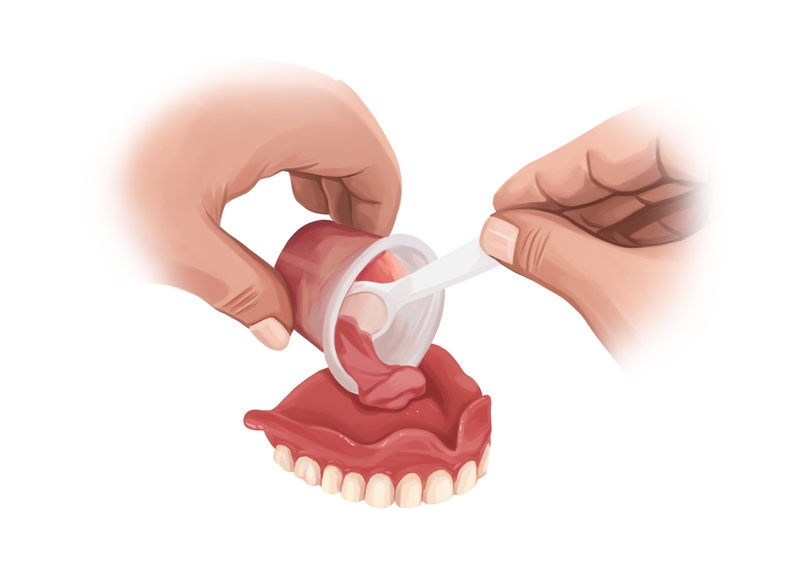- It is natural for new dentures to feel too large. It may take several months for you to get used to your dentures.
- If you find new dentures inconvenient, try using an adhesive. If that does not help, you can have your dentures relined.
- If dentures are still uncomfortable with an adhesive or after relining, you may need new dentures.
Use Authority Dental to find a denture dentist nearby, or sign up for a dental discount plan and save up to 60% on all dental procedures, including dentures.
Do your dentures seem too big for you? Here’s everything you need to know.
How to fix dentures that are too big?
If you feel that your dentures do not fit, you can use one of the following solutions.
Try denture adhesive
A denture adhesive is a product used to hold dentures in place. It is available as a paste, pad, or powder.
Denture adhesive can be helpful for patients who are not quite sure whether they are experiencing discomfort because the denture-fitting process is not yet complete, or because their dentures are loose or ill-fitting.
Get dentures relined
Denture relining involves reshaping the area between the denture and the gums to prevent irritation, lumps, and other injuries resulting from excessive pressure on the soft tissues.
Ask your dentist if a reline is an appropriate solution for your denture.
However, Harry Lee, DMD, warns: "When a patient gets a new set of dentures, the most common thing I hear during the first week is, 'Doctor, these feel huge! They are like a mouthful of marbles.' It is a universal feeling, and I always reassure them that it is an entirely normal part of the process."
A reline may be helpful if you have been wearing the same dentures for a long time and they no longer fit properly due to bone loss. Your bones and tissues will constantly change and shrink over time. Over time, you may notice the denture not fitting as well.

Lee stresses: "My job is to make minor adjustments to relieve any sore spots that develop during this 'break-in' period. That initial bulky feeling almost always fades away as your body adapts. It is not that the denture is too big; it is that your mouth needs time to get used to being the right size again."
Add dental implants for better support.
A dental implant can be an option for increased denture retention and support.
There are several ways implants can be utilized to restore a person’s smile. Dentists may offer dental implants as a permanent solution for lost teeth. High-quality implants with a complete fixed dental restoration not only look and feel like natural teeth, but also function similarly.
If several implants and a fixed, non-removable restoration are not an option for you, you may discuss with your dentist the option of 2-4 implants to help snap your removable denture into place. This may improve the fit of your removable denture.
Consider new dentures
New dentures are usually an option for patients who have been using their previous ones for several years. Even the best dental labs nearby may not be able to adjust your dentures to fit your face better.
Over time, the materials can wear down significantly. In addition, the volume of the jawbone decreases with age. This leads to loose-fitting dentures over time.
If a reline was attempted and the dentures still do not feel correct, you can discuss a new set of dentures with your dental provider.
FAQ
Why do my dentures feel too big for my mouth?
Even high-quality dentures often feel too large during the first few weeks or months. They do not match the natural anatomy of your mouth and require an adjustment period. Even the dentures you have worn for years can gradually become too big. This is usually due to reduced bone volume.
Can denture teeth be shortened?
Dentists can shorten denture teeth. Please do not do it on your own. Only your dentist can ensure there are no problems with your bite.
Harry Lee, DMD
Your brain is playing a trick on you. I often explain it like this: for a long time, your tongue and cheeks have enjoyed much extra space where your teeth used to be. They spread out and got comfortable. A new denture correctly restores the volume you have lost, but to your brain, which has adapted to the smaller space, it feels foreign and oversized. Your muscles have to relearn the boundaries of your mouth completely. This is a sensory and muscular adaptation. Your job is to be patient and practice talking and eating, which will help retrain your brain and muscles to accept the denture as the "new normal."